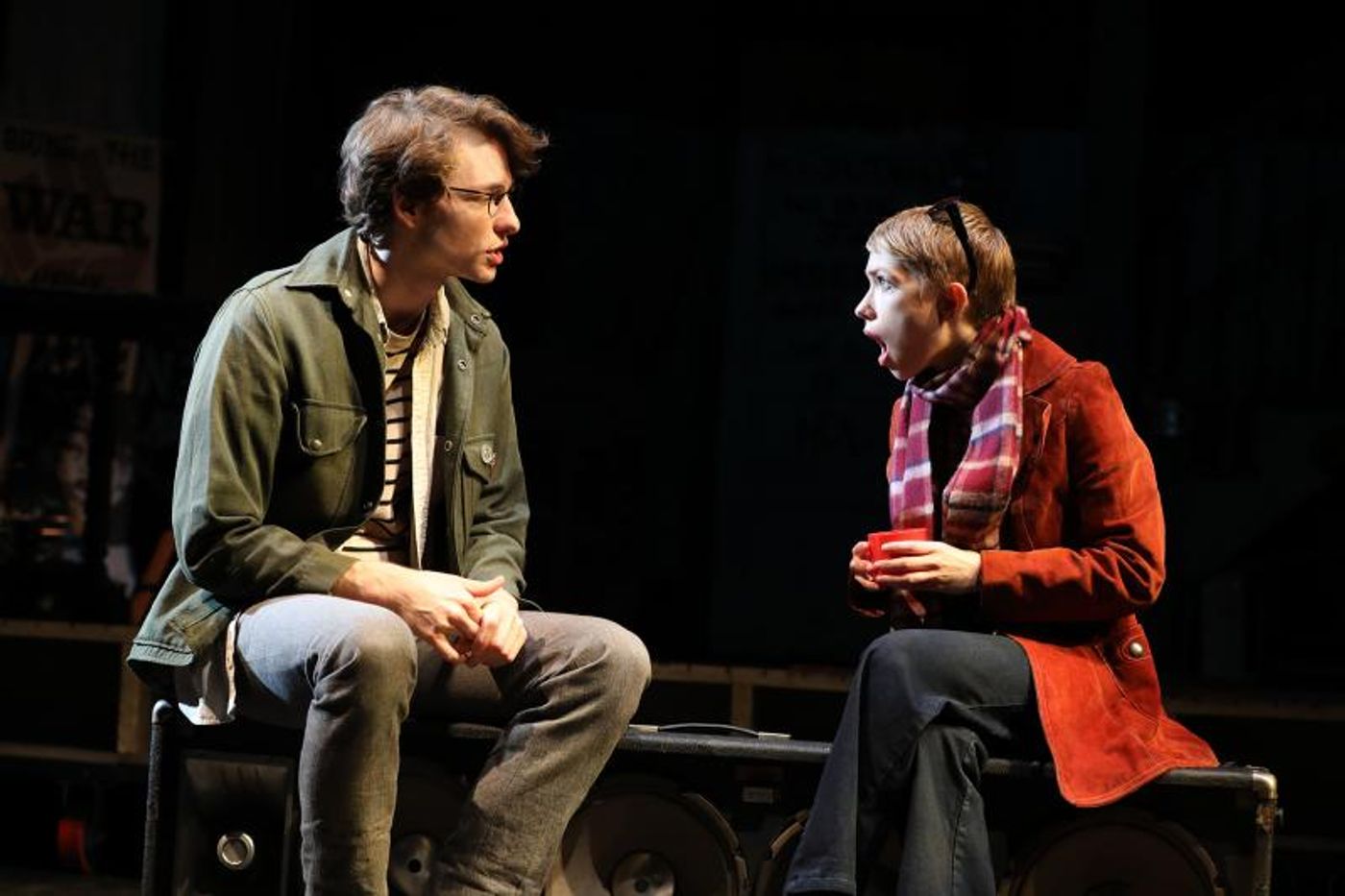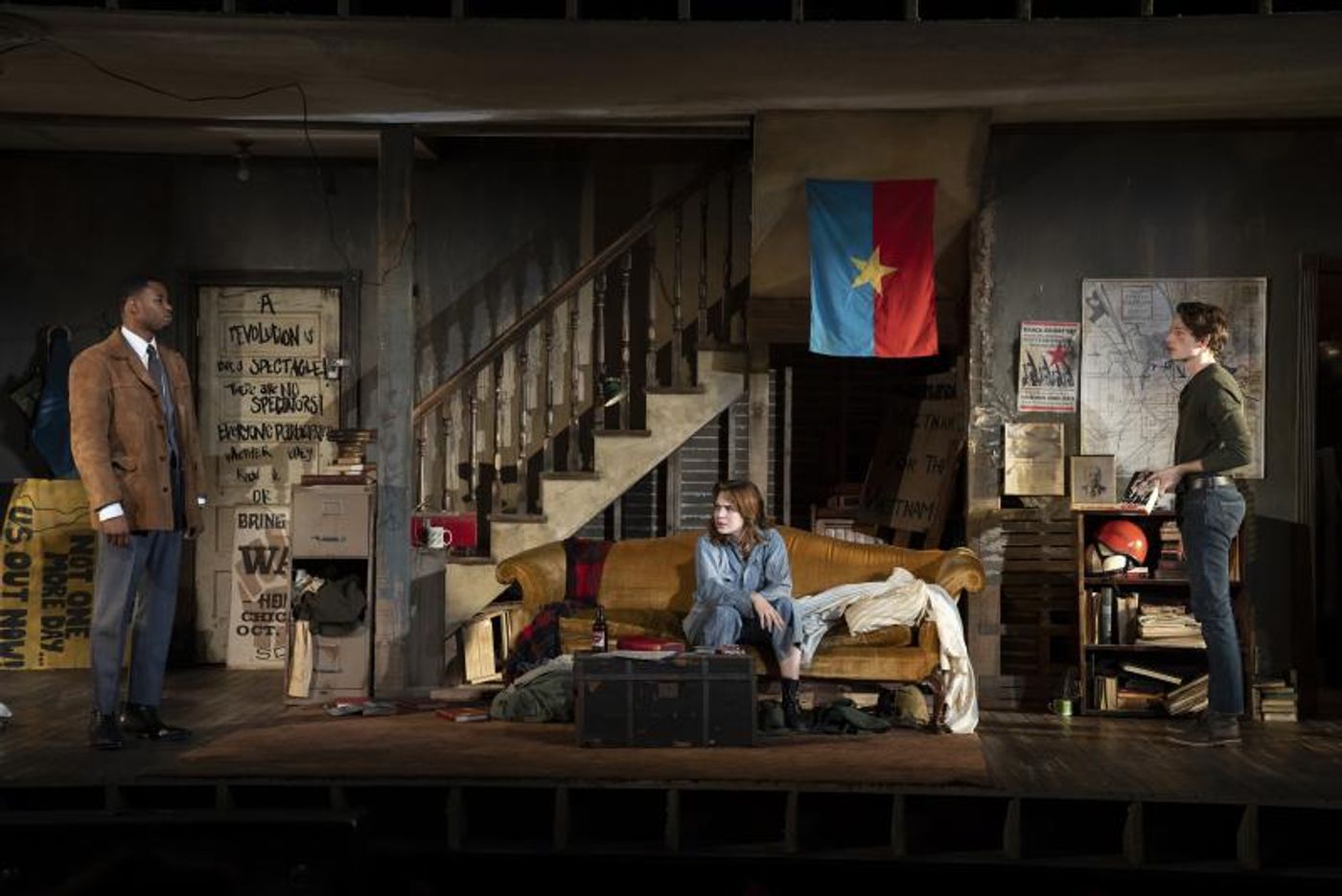Review: Steven Levenson's Charming and Funny DAYS OF RAGE Takes a Sentimental Look at Young '60s Activists
"I hate white people," blurts out a diminutive, small-voiced white teenager, trying to convince the white activist she just met that she would be a valuable addition to his collective. "I can't help it. I always have."

(Photo: Joan Marcus)
Meanwhile, a white radical leftist handing out leaflets about the disproportionate number of young men of color being drafted to die in the Vietnam War tells the nice and attractive black fellow who seems interested in her, "I'm a racist... I mean, everyone in this country is a racist. But I am too. I acknowledge that."
Though the early scenes of Steven Levenson's charming and funny Days of Rage cut a sharp satirical edge, the author and director Trip Cullman ensure that there's also great deal of sympathetic warmth in this story of young, clumsily progressing white activists whose role models are The Black Panthers and who occasionally equate being good allies with the willingness to admit self-loathing.
But under the laughs and the political tension is a sweet coming of age story of young people trying to find their places in a world they want so desperately to make better for everyone.
The title comes from an actual event; three days of anti-war protests held in Chicago, 1969, put together by Students For A Democratic Society, a national organization advocating non-violent civil disobedience. Unfortunately, a more violent faction of the event, backed by the militant Weather Underground movement drew enough attention to scare off many of the expected 25,000 peaceful protesters, leaving those remaining outnumbered by awaiting Chicago police officers who were prepared to put down a riot.
Levenson's story takes place in an upstate New York college town where three young twentysomethings, the kind who regard liberal Democrats as leaning too far to the right, live as a collective in a worse-for-wear two-level house (terrific set by designer Louisa Thompson) with protest signs strewn about and a Viet Cong flag hanging in the living room.
Spence (Mike Faist) used to be in a romantic relationship with Jenny (Lauren Patten) and still regard themselves as best friends. Lately, Spence has been sleeping with Quinn (Odessa Young), but monogamy is frowned upon under their roof and everyone is free to have consensual sex with whomever they life.
House decisions are made by votes, but aside from that, and the continual need to come up with money to pay the bills, the living is pretty mellow. Things were different when two other members, Jeff and Richard, led humiliation exercises to keep everyone in line, set up schedules assigning who was sleeping with who and tried convincing the other three to join them in targeted acts of violent resistance. But they snuck out one night, taking the group's only car with them.
Spence meets runaway Peggy (Tavi Gevinson), who has been sleeping in the bus station and is willing to express support for any radical cause if it means having a safe place to stay. When her attempt to show dedication to the anti-war cause doesn't convince Spence, her willingness to give him a stash of money for rent does.

(Photo: Joan Marcus)
Though the soft-spoken newcomer shows signs of a naïve, pampered background at first ("She thought Chairman Mao was a cartoon character!") some of the play's funniest moments come when Peggy starts learning the lingo and attitudes of the revolution and Gevinson hilariously begins barking out orders and displaying survival tactics.
Jenny has begun dating Hal (J. Alphonse Nicholson), who she met while distributing leaflets. Of African-American descent, Hal is against the Vietnam War ("I voted for Humphrey.") but he supports his younger brother, who volunteered to serve in the army. He also shows a lot of patience when Spence tries to explain institutionalized racism to him.
"Look at your brother. Here's a black man being used by white men to kill yellow men. I hope he realizes that."
"I'll let him know."
Things get serious when word gets out that Jeff and Richard were involved in a violent incident and the housemates start noticing evidence that they're being followed and watched.
An epilogue reveals the details of what happened in Chicago and how the characters turned out later in life. One sums up these radical days as part of "the excesses of youth." The kids of Days of Rage didn't succeed in changing the world for the better. But they fought for the good cause as best they could, and in doing so perhaps changed themselves for the better.
Reader Reviews
Powered by
|
Videos

